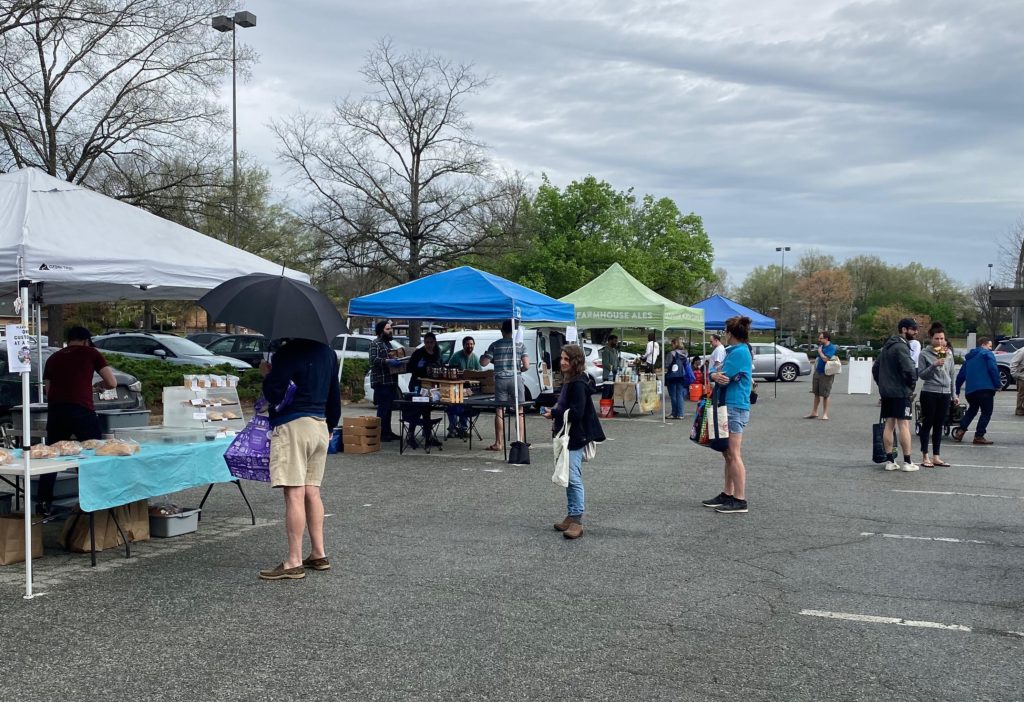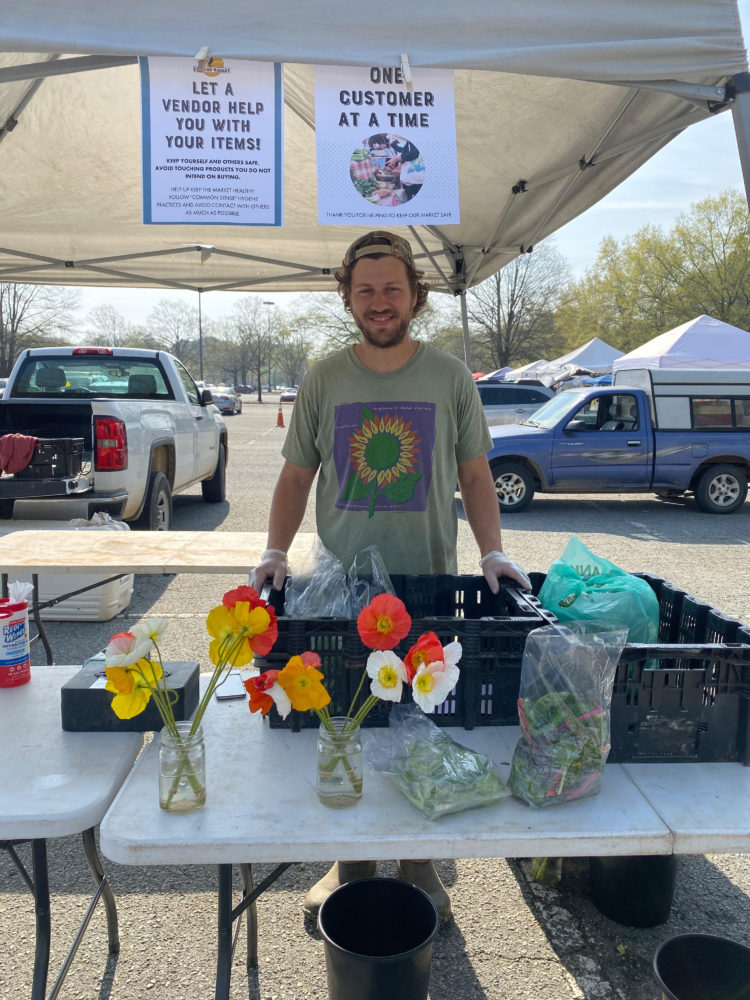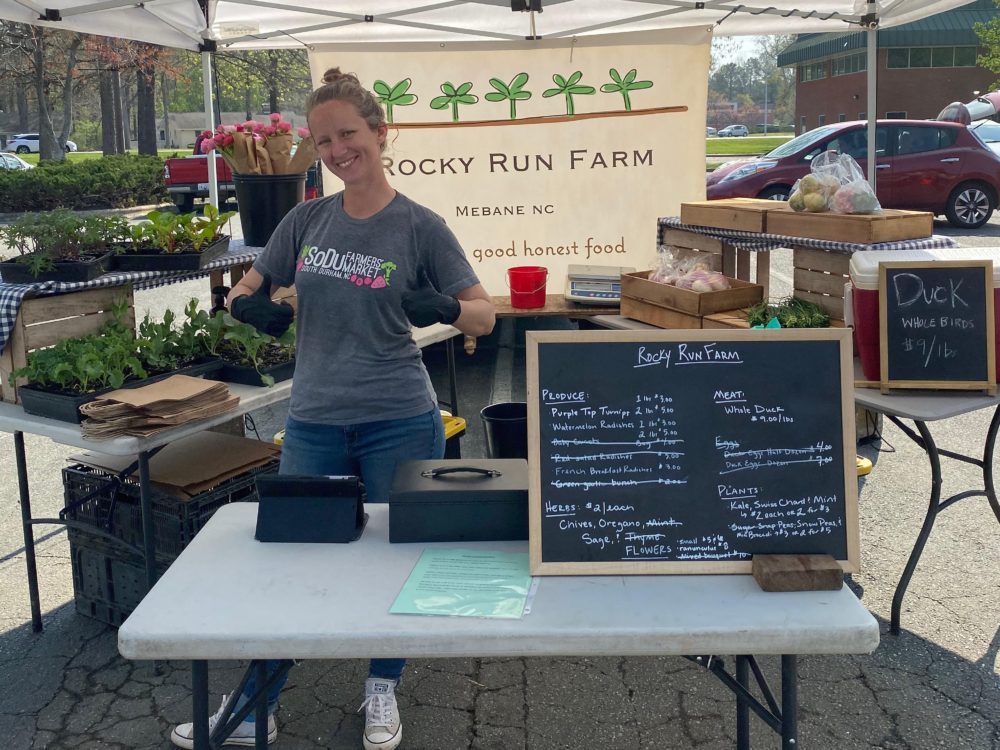by Katie Murray, CFSA Development Coordinator | Wednesday, Apr. 8, 2020 –

The COVID-19 pandemic has created a climate of unpredictability and inconsistency for millions around the globe and farmers are no exception. Yet, amid all the uncertainty, many growers at small farms are discovering new opportunities. As the supply of produce, eggs, meat, and other staples dwindle at grocery stores across the country, consumers are turning to their local farmers to feed their families.
Last week, we spoke with a few farmers in the Triangle-region of North Carolina who are rising to the challenge as they quickly adapt their business models to keep up with the demand.

Joe Tedrow, Split Acre Farm
Joe Tedrow and Lisbeth Rasmussen of Split Acre Farm in Rougemont, NC planned to leave their CSA model behind this year and focus their efforts on selling sustainably grown produce and flowers at the Chapel Hill and Carrboro farmers markets exclusively. But when the pandemic became more serious, and it looked like the markets might shut down, they quickly decided to rethink their strategy.
“The markets are our bread and butter. They are 90% of our business,” Joe says. “We wanted to bring more produce to the markets because we had been doing really well there. But not knowing how long the farmers markets would be open or what customer traffic would be like, we decided to relaunch our CSA. We pivoted and redid everything to accommodate the CSA and, actually, this year is bigger than our first two years combined. We filled 50 spots in 24 hours.”
“We pivoted and redid everything to accommodate the CSA and, actually, this year is bigger than our first two years combined. We filled 50 spots in 24 hours,” Joe Tedrow, Split Acre Farm.
Joe and Lisbeth’s CSA has provided them with some much-needed security during this unpredictable time and allows them to pay their employees and their bills. Whatever produce is left over, after they have fulfilled their CSA commitments, goes to the markets they serve and will also be sold through on-farm pickups soon. “Instead of focusing on one revenue stream this year, we have moved to all the revenue streams,” Joe says.
Other farmers have lost their regular markets and are adapting to completely new systems and ways of getting their products to customers.
Whitney Allen of Rocky Run Farm in Mebane, NC is, in a word, busy.

Whitney Allen, Rocky Run Farm
With her husband working off the farm full-time, Whitney is a self-proclaimed “one-woman show,” managing the planning, planting, harvesting, packing, and delivering of produce and flowers (she also sells ducks and duck eggs)—all while caring for the couple’s toddler every day.
Normally, Whitney would sell her products in bulk to restaurants each week but has now turned her attention to home deliveries and online pre-order sales—something she was not doing before the pandemic. She’s also making sure that the products she sells at market are as safe as possible for consumers and require the least amount of handling.
“Currently, I’m still doing the farmers market because fortunately, it’s still open,” she says. “My system has changed though because I now have to pre-package things that I wouldn’t normally package—my salad radishes are in bags; my turnips, which I normally sell by the pound, are in bags—so that takes extra time.”
Learning a new online sales platform, organizing multiple home delivery orders, and preparing pre-orders for the South Durham Farmers Market also takes a lot of time and adds a new level of complication to an already hectic schedule.
Yet, despite having to learn a lot of new skills in a short amount of time, Whitney says being this busy is definitely a good thing. She’s glad to see so many new customers investing in the local food system.
“It is important for consumers to understand that we have all really stepped it up and we have food. We have food and we’re here for them.”
“It is important for consumers to understand that we have all really stepped it up and we have food. We have food and we’re here for them,” Whitney Allen, Rocky Run Farms.
And they are. Whether you prefer to get your locally-grown or raised items at a farmers market, in a CSA share, or directly on the farm, small farms are adapting their marketing strategies and channels rapidly to make fresh food as accessible to consumers as possible in a time of social distancing.
Don’t miss CFSA’s growing list of 140+ farms throughout the Carolinas offering home delivery, on-farm pickups, and more!
Want more?
- Read more about how the coronavirus is impacting farmers, farmers market workers, and eaters in the Carolinas on our blog.
- It’s not too late to join a CSA! While we’re nearing the end of when many farms close their CSA signups, it’s not too late to join. Use our interactive map or
- We’re fighting hard to ensure farmers markets stay open as long as grocery stores do. While we’re posting all updates to the blog, we’re also sending out action alerts to keep them open, and social media posts if you prefer news in that way.


